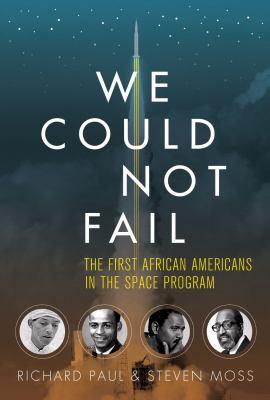
We could not fail : the first African Americans in the space program
Available Copies by Location
| Location | |
|---|---|
| Stamford | Available |
Browse Related Items
| Genre |
| Biographies. |
- ISBN: 0292772491
- ISBN: 9780292772496
- Physical Description x, 300 pages : illustrations ; 24 cm
- Edition First edition.
- Publisher Austin : University of Texas Press, 2015.
Content descriptions
| Bibliography, etc. Note: | Includes bibliographical references and index. |
| Formatted Contents Note: | A man of firsts: Julius Montgomery -- "There was a lot of history there": Theodis Ray -- Stronger than steel: Frank Crossley -- Dixie's role in the Space Age -- First of race in space: Ed Dwight -- The view from space: George Carruthers -- "Huntsville, it has always been unique": Delano Hyder and Richard Hall -- The country spartacus: Clyde Foster -- Water walkers: Morgan Watson and George Bourda -- Conclusion -- Appendix: Relevant census numbers on employed professional and skilled labor for NASA host states. |
| Immediate Source of Acquisition Note: | LSC 37.50 |
Additional Information

BookList Review
We Could Not Fail : The First African Americans in the Space Program
Booklist
From Booklist, Copyright (c) American Library Association. Used with permission.
*Starred Review* At a time when so much national attention was focused on the tumult of the civil rights era, of African Americans securing the most basic rights of citizenship, several black men were pioneering in the space industry. Paul and Moss chronicle the particular paths of these men, working in the civilian or military space programs, who have mostly been lost to obscurity. A major challenge for them was the fact that so much of the burgeoning space industry was located in the South, an area not welcoming of black ambition. Julius Montgomery, Frank Crossley, Otis King, Ed Dwight, and George Carruthers were among the engineers, technicians, mathematicians, astronomers, and astronaut candidates whose tactics did not consist of protests, marches, or lawsuits but of dogged concentration and determination to be a part of historic developments, even if behind the scenes. The authors also examine how the Kennedy and Johnson administrations used the space program to advance technology, develop the South economically, and push for equal employment opportunity through NASA. This account of 10 pioneers, told against the backdrop of the civil rights era, highlights the intersection of technology and race in U.S. history, continuing innovations in technology, and the struggle of minorities to participate.--Bush, Vanessa Copyright 2015 Booklist

Library Journal Review
We Could Not Fail : The First African Americans in the Space Program
Library Journal
(c) Copyright Library Journals LLC, a wholly owned subsidiary of Media Source, Inc. No redistribution permitted.
Paul (documentary producer) and Moss (English, Texas State Technical Coll.) offer a complementary narrative to our national story about the civil rights movement, providing a nuanced look at how integration and civil rights ideals shaped and were shaped by federal employers. Focusing on the first African American men the National Aeronautics and Space Administration (NASA) employed as scientists and professionals, the authors describe the particular challenges of integrating flight centers in Cape Canaveral, FL; Huntsville, AL; and Houston. In ways that will resonate in today's ongoing post-Ferguson struggles, each locality in the South created its own insidious and particular Jim Crow system; causing moving among communities to be dangerous for African Americans. Where knowing local racial structures was crucial to survival, applying federal equal opportunity employment mandates was challenging but especially important. Paul and Moss contextualize the stories of ten black scientists and engineers within the larger histories of World War II, federal equal employment regulations, NASA, segregation, and the Jim Crow South. Their compelling narrative's only shortcoming is that the larger historical thread often overtakes the men's stories (women didn't become part of the flight center until later). It is to be hoped that the radio documentary from which this grew will fill that gap. -VERDICT Vital and of interest to all Americans, from history and space buffs to students, researchers, and casual readers.-Candice Kail, Columbia Univ. Libs., New York © Copyright 2015. Library Journals LLC, a wholly owned subsidiary of Media Source, Inc. No redistribution permitted.


